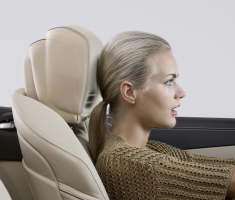
— A Mercedes headrest lawsuit survived a dismissal bid by the automaker, but most claims were dismissed after the plaintiffs alleged the active headrests mistakenly deployed.
The Mercedes-Benz NECK-PRO was designed to prevent whiplash injuries in rear-end crashes.
The active head restraint (AHR), manufactured by Grammer, should spring forward when a vehicle is struck from behind and quickly push the cushioned headrest out to catch the occupant's head.
According to the headrest class action lawsuit, the forward-facing padded surface of the NECK-PRO headrest is mounted to a plastic carriage that is loaded by pre-tensioned springs when stowed in the headrest.
A plastic bracket acts as the triggering mechanism and holds the spring-loaded release in place until an electronic sensor connected to the Mercedes computer control unit indicates a rear-end collision is occurring. The bracket should quickly release and allow the carriage to be forced forward by the springs.
But the Mercedes headrest lawsuit alleges the brackets are made of cheap plastic which cracks and falls apart under the constant pressure of the springs in the headrest. This allegedly causes the Mercedes headrest to suddenly deploy at any time, and without a rear-end crash.
The plaintiffs claim the sudden deployment of the active headrest not only injures occupants, but a driver can become distracted from a sudden unexpected blow to the head.
Mercedes-Benz class action lawsuit documents reference a technical service bulletin (TSB) issued to dealerships in 2007 entited, “Restraints – Head Restraint Activate Without Cause.” The TSB says the headrest problem “may be caused by damage to the seat wiring harness causing a short circuit.”
The Mercedes headrest lawsuit was filed by nine plaintiffs from Florida, New York, North Carolina and California.
Motion to Dismiss The Mercedes Headrest Lawsuit
Mercedes-Benz filed a motion to dismiss the class action lawsuit which argues seven of nine plaintiffs lack standing to sue because they don't claim their headrests malfunctioned.
According to Mercedes, the seven plaintiffs have not suffered an “injury in fact” or, at the least an injury is not "actual or imminent."
But the judge says the plaintiffs claim they were injured because they “paid a premium price” for the Mercedes vehicles “because [they] trusted Mercedes to provide high-quality and safe automobiles.”
The judge ruled against Mercedes and found the plaintiffs have standing.
"Therefore, Plaintiffs allege that the 'value of [their] vehicle[s] has been diminished as a result of the defective NECK-PRO[,]' and had they 'known of the AHR defect, [they] would not have purchased [their] vehicle[s], or would not have paid as much for them as [they] did.'” — Judge Rodolfo A. Ruiz II
However, Mercedes argues nationwide class allegations should be dismissed because the plaintiffs do not have standing "to pursue relief on behalf of out-of-state class members."
And according to the judge, because the plaintiffs are residents of only four states, do not claim a legal injury in any state besides their home state and do not allege an injury under the laws of any other state, each plaintiff lacks standing to represent a nationwide class.
A Magnuson-Moss Warranty Act claim was tossed out because the class action includes less than 100 plaintiffs, precluding claims due to the plain terms of the statute concerning the number of plaintiffs.
Although the plaintiffs allege Mercedes knew about the supposedly defective headrests when the vehicles were sold, the judge says a reader of the lawsuit is asked to "merely accept" Mercedes knew about the alleged problems.
According to the judge, the plaintiffs don't allege "concrete facts on which a reader could reasonably infer" that Mercedes knew about any alleged headrest problems.
And regarding the TSB at issue, the judge says it explicitly says what the real problem is and it isn't cheap plastic. According to the bulletin, the headrest problem “may be caused by damage to the seat wiring harness causing a short circuit.”
"One lone TSB that fails to suggest the product is defective—much less reference the specific defect at issue—does not lend much, if any, support to the notion that Defendants knew or should have known that faulty headrest components were present in “hundreds of thousands,” of Mercedes vehicles." — Judge Ruiz
The judge ruled that although the plaintiffs have standing to bring this lawsuit, they do not have standing to represent a nationwide class for claims based on state law.
By the end, the judge dismissed all claims against Mercedes other than one, and that one claim applies to only two Florida plaintiffs.
The Mercedes headrest lawsuit was filed in the U.S. District Court for the Southern District of Florida - Lewis, et al., v. Mercedes-Benz USA, et al.
The plaintiffs are represented by Kozyak Tropin & Throckmorton, Gilligan, Gooding, Franjola & Batsel, Searcy Denney Scarola Barnhart & Shipley, and Santiago Burger.




